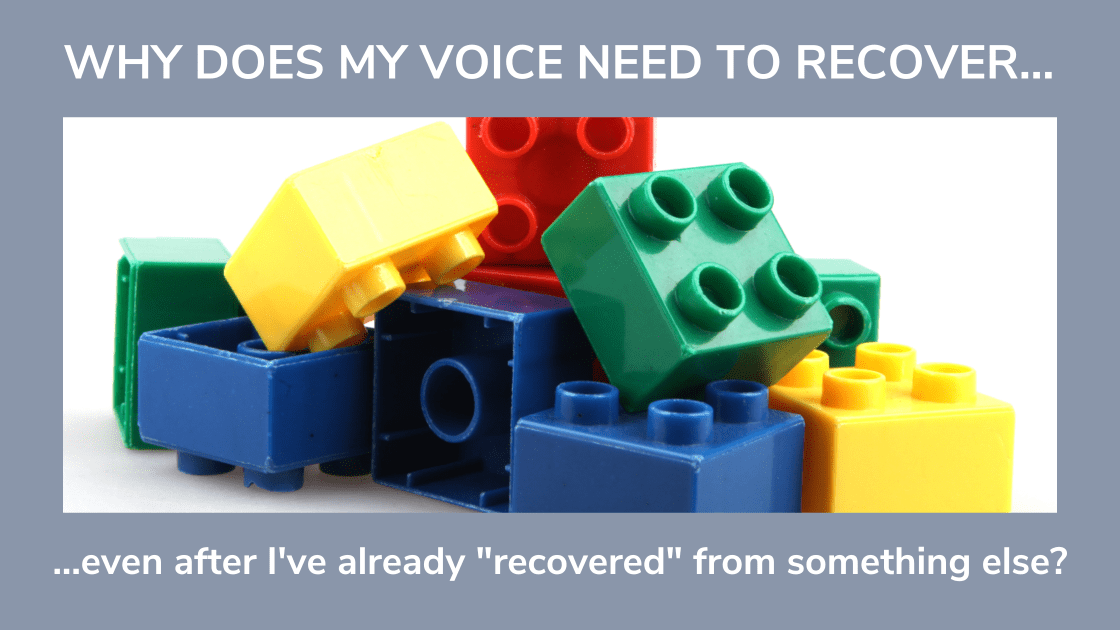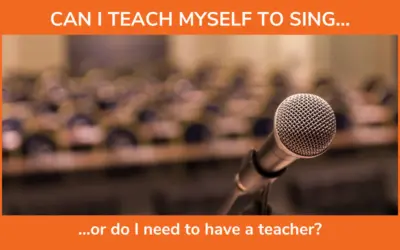Inside This Article
WORKING WITH THE DEEPER VOCAL RECOVERY THAT COMES AFTER A PHYSICAL/EMOTIONAL/PERSONAL RECOVERY (OF ANY SORT)
Have you ever noticed that even after you recover from a cold or illness, or a blow to the system of any sort (surgery, personal loss/grief, a change of life circumstances… divorce, moving, etc.) that of course there’s a period of recovery, but then there seems to be some other “second recovery” that’s needed after the first? This can be true, even (or especially) after a vocal injury!
You’ve recovered in general, but something is different or “not quite right” about your voice or singing/speaking long after the event and supposed recovery. It’s strange.
I encounter this phenomenon time and time again with my voice students. There’s a recovery after the recovery that doesn’t usually seem to ever get addressed: doctors say, you’ve recovered, you’re all set… but, are you? You’ve moved, your life is settled now… but, is your voice? And sometimes, we don’t even notice that we haven’t quite fully recovered and we move on as we have – as if things have gone back to normal… but, have they?
The question is, when this happens, what can we do about it? What is this all about? And, how can we be more aware of this process in order to optimize our learning, growth and performance as vocalists – and high functioning individuals in general?
A personal experience:
Over ten years ago, my appendix burst and I needed emergency surgery. It was a very intense experience that left me with a 5 inch scar between my belly button and pubic bone (like a c-section minus the birth part)! And, wow, was it a BLOW to my system.
I was in the hospital for over a week and had catheters and drains. And, because my appendix burst, I needed very strong antibiotics too. When I got home from the hospital. I could not stand at all nor could I lie flat on the bed. I was very “folded” around the wound (flexed) and in a lot of pain. It took me WEEKS (around 6) to be able to stand and lie flat.
By then, the doctors were happy with my condition, stitches were removed and they said I was “good to go”, but I knew that that was just the beginning of a much longer recovery period. My breathing was altered, my head/neck/larynx position had changed, and I couldn’t stand truly upright at all – not optimally.
My voice was tired and weak and I had a long way to go.
Once I was recovered enough to move around and eat and drink, etc. normally, I began my second recovery process of regaining my full function physically and vocally. This involved many Feldenkrais lessons to explore and re-educate the connection between my feet and hands, mouth and pelvis, breathing and seeing. I clarified the diagonals across the torso, breathing in all directions and worked to regain the vocal/laryngeal freedom I once had.
It took months, but eventually, I made a full “second” recovery and ended up feeling MORE functional than I did before the whole episode happened. NOW, I was “good to go” but at a much higher level.
With my students:
I’ve heard countless stories like this from my students too… at least the first part.
Something happens: COVID, illness, childbirth, injury, etc. and by normal standards they have recovered, but something isn’t right. Something has been lost vocally, especially, that hasn’t recovered along with the rest.
They feel good, their energy is back and symptoms are gone, but some elements of voicing have vanished or become difficult. It can even be more sneakily subtle than that; their voice is ok, but the fun isn’t there, the joy of singing and making sounds has somehow diminished. Some vital, creative connection is lost.
Now, I could come up with all sorts of stories about why this happens: maybe it’s muscular atrophy or a neurological “use it or lose it” phenomenon. Maybe it’s that the physical compensations for pain haven’t stopped compensating even after it’s no longer needed or maybe it’s just that the system has been changed in one major way, which has been recovered from, but everything else shifted a little too, did all of those little shifts not “un-shift?”… I don’t know.
But, something has happened.
There’s residual fallout.
And, often one’s voice and singing will show the changes even if everything else seems ok.
Often one’s voice and singing will show the changes even if everything else seems ok.
So what’s the way out of this? What can we do?
Well, what we can do to help vocal recovery is ideally what we were already doing before and during the event… playing and being as aware as possible!
The way out is to revisit and update basic functions
- swallowing
- turning
- breathing
- sitting
- walking…
as well as lots of movements and patterns related to speaking and singing –
- tongue movements
- phonemes
- crazy combinations of movements and sounds…
until we regain a sense of ease and play, integration and creativity with our voice/self.
WHY PLAY?
We play so that we can almost “confuse” our way out of any residual patterns or habits that have taken hold as a result of and after any “blow to the system.” Reveling in the novel and weird is a great way to bypass the old and re-establish a new, higher order of functioning in general.
Play. Play some more.
Play the gray away!
Play to perturb the system in new and fun ways that allow everything to settle and resettle again and again in new and even more functional ways. This is great to do ALL THE TIME, but especially “in recovery.”
By the way, this is exactly one of the functions of THE SINGING SELF PROGRAM. It’s FILLED with exactly these kinds of experiences, guided and curated by me. And, when you allow yourself to go through them on a regular basis AFTER an initial recovery from any traumatic event (physical or otherwise) you will be able to tease your ENTIRE SYSTEM (and your voice along with it) into new and wonderful ways of functioning. Without that kind of mindful play and novelty you may never fully recover after such an experience.
I’ve met so many people who – after a surgery or physical/emotional/personal trauma – don’t complete that “second recovery” and as a result, lose something greater… their freedom to explore life with pleasure and fun.
Don’t let that be you.
Keep recovering.
Keep recovering after recovering and eventually, you’ll be in a new order of functioning – a continually-updating, ever-optimizing order of functioning that can “take a blow” and not only survive, but continually bounce back better and better than ever.





0 Comments